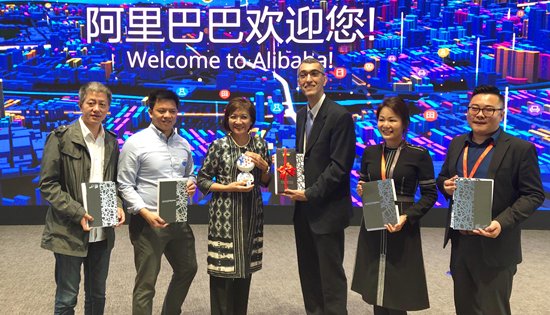|

From
left: Steven Zheng of Alibaba.com; Ray Alimurung, CEO of
Lazada Philippines; Undersecretary Nora Terrado; Farhad Sami,
Senior Director for International Policy and Public Affairs
of Alibaba Global Business Group; Gladys Chun, General
Counsel and Head of Government Affairs at Lazada Group; Tony
Yin, Global Business Development Manager at Alibaba.com. |
PH exporters
visit Alibaba campus in China
By
DTI-TIPG
November 19, 2018
MAKATI CITY –
Department of Trade and Industry (DTI) Undersecretary for Trade and
Investments Promotions Group (TIPG) Nora Terrado headed the recently
concluded 60-man Philippine delegation in their technical visit to
the headquarters of Chinese e-commerce giant Alibaba in Hangzhou,
China on November 4, 2018.
The visit was conducted on
the sidelines of the first China International Import Expo, where
the Philippines participated. Known as the “Alibaba Campus,” the
headquarters accommodates around 9,000 employees.
Led by Farhad Sami, Senior
Director for International Policy and Public Affairs of the company,
Alibaba representatives toured the Philippine delegates to the
150,000-sqm open office space that has a campus-style layout.
As the world’s leading
e-commerce platform, Alibaba shared with Filipinos its best
practices on providing fundamental technology infrastructure and
marketing reach that help small and medium businesses grow.
For many, the rise of
Alibaba and its recent influence on the global market have ushered a
new retail era and changed the consumer behavior of mobile-connected
individuals worldwide.
During the visit, Lazada
Philippines CEO Ray Alimurung presented how Filipino entrepreneurs
could benefit from doing business in the digital economy.
“The Southeast Asian
e-commerce market is ready and it’s growing fast,” he said. “Now is
the time [for Filipino business owners] to research, test, and learn
the e-commerce market,” he added.
Meanwhile, Terrado hoped
that the visit to the Alibaba Campus had been insightful for the
Filipino exporters. She also encouraged Filipinos to continue to use
online platforms such as Alibaba in order to enter the Chinese
market – especially now that China’s demand for Philippine
agriculture products like fresh fruits is growing rapidly.
“For years, Alibaba has
shown how internet can provide small companies with infrastructure
and marketing reach, which help merchants and brands grow and
compete more effectively in the global market,” she said. “Through
this tour, we seek to learn and adapt the company’s ways of doing
business within e-commerce and cross-border transactions.”